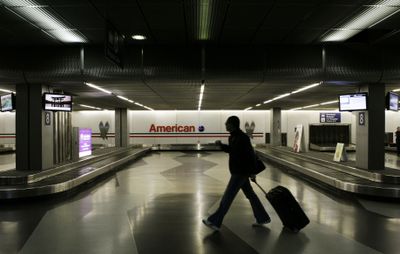Cost of business travel predicted to increase next year

HACKENSACK, N.J. — A typical business trip will cost a bit more next year, according to a new report by American Express Co.’s travel management arm. This is in spite of an expected decline in air travel demand because of a slowing economy and corporate belt tightening.
The cost of an average domestic trip will increase $31, or 2.8 percent, to $1,139, including airfares, hotel stays and car rentals, American Express Business Travel predicts in its 2009 outlook, released Wednesday.
The average international trip will rise by $147, or 4.3 percent, to $3,556.
Airfare hikes may be kept in check by a slowing economy, as carriers will be forced to reduce prices to lure passengers. Also, lower fuel prices could prompt airlines to lower fares.
“It’s possible that airfares in 2009 may decrease,” said Herve Sedke, a vice president and general manager in the Global Advisory Services division of American Express. However, additional airline fees and expenses may still bump up the overall price of travel. Baggage fees, dining, airport parking and package shipping can add about $400, Sedke said in a telephone press conference.
The forecast, which looked at global trends in airfares, hotel rates and rental car use, predicts domestic economy airfares will rise or fall next year within a range of 5 percent to minus-5 percent. International business-class fares will likely increase by as much as 6 percent.
Economic uncertainty makes it difficult to make more specific predictions, Sedke said.
Most regions throughout the world will see declines in hotel occupancy, the company predicts, which will tend to forestall room rate hikes.
Rates at midpriced American hotels will either fall 1 percent or increase up to 5.5 percent. Upscale U.S. hotel rate changes will range between minus-2 percent and 4.5 percent, the company predicts.
New York City hotel rates will increase as much as 9 percent, the same as Washington, D.C., and more than any other American city.
“Gateway cities will be able to hold prices better than non-gateway cities,” said Frank Schnur, vice president of Global Advisory Services. Gateway cities have major airports through which many travelers pass, making connections.
As companies strive to cut travel costs, they may be more inclined to book meetings at a Newark airport hotel, instead of pricier accommodations in Manhattan, he said.
Steps companies have taken to cut costs include the use of teleconferencing in place of face-to-face meetings; requiring same-day returns to eliminate hotel stays; booking well in advance to lock in lower fares; and encouraging travelers to stay with family and friends or to share hotel rooms.
“By improving behavior and compliance, managers can cut 30 percent off the budget and still travel the same amount,” Schnur said.
Competition for corporate accounts should keep car-rental prices down, but expect companies to make up for it by cutting late-return grace periods.
“Now, if a car is returned three hours late, you will have to pay for an additional day,” Schnur said.